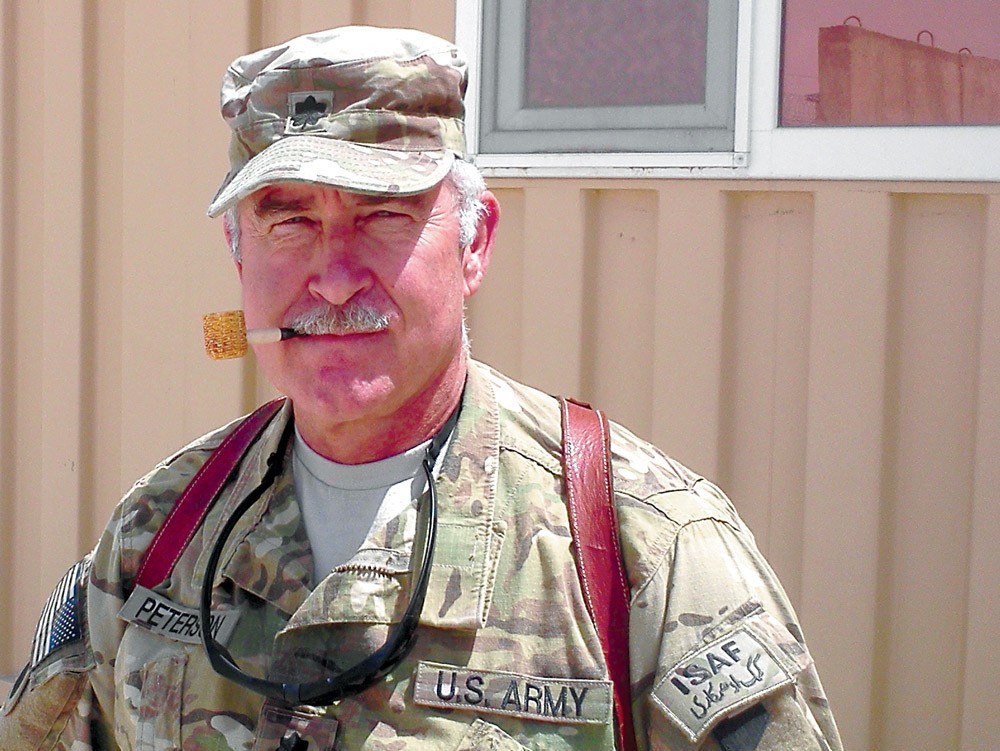
Since 1998, Vance Peterson has dispensed justice from his bench in the Spokane District Court.
But in his new job, there’s no bench, not even a robe. His gavel has been replaced by a rifle; his robe, a suit of body armor.
Last year, Peterson took a break from the court to head to Afghanistan with the Washington Army National Guard.
As an operations advisor to Afghan police forces*, the judge helps Afghans enforce the law in the midst of an insurgency that’s bedeviled NATO forces for more than a decade.
“The mission was exactly what I had been training to do my entire military career,” says Peterson, who spent 28 years in the Army Reserves before retiring.
The assignment to Afghanistan started with a phone call from a longtime friend, who he says recognized that his training as both a Special Forces officer and a judge would come in handy.
Peterson has long been involved in veteran’s affairs, since he started the Spokane County’s veteran’s court, which caters to the unique needs of the military. But the judge had never seen combat before.
“This is an itch he always wanted to scratch and he got the opportunity to go do this,” says Fred Aronow, a longtime friend and a former Superior Court commissioner. “I know that he’s drinking it in.”
Peterson, 59, left last October and is currently stationed outside of the northern Afghanistan city of Mazar-e-Sharif.
While Afghanistan has a fairly well-developed legal system — much of which is based on Islamic Shariah law — Peterson has been tasked with helping the police transition from a paramilitary force to a law enforcement force.
He’s mentoring the chief of police for Balkh Mazar-i- Sharif province, and part of that mentorship is learning to do the paperwork that comes with policing.
That means getting a search warrant before raiding a house.
“A year ago, they were conducting searches [and] they did not necessarily use warrants to search the various compounds where criminal activity was occurring,” Peterson says. Now, police in the province get a warrant from a prosecutor first, which Peterson called “a substantial step forward.”
And police forces there don’t always get along due to the country’s ethnic divisions.
“Tajiks, Uzbeks, Turkmen, Pashtun, a lot of different ethnic groups comprise these law enforcement organizations,” Peterson says. “You have to work with a significant history.”
While there are law enforcement officers from the U.S. serving in Afghanistan, Peterson is the only judge working in a security force assistance team, as his unit is known, according to U.S. Army Colonel Thomas F. Heslin.
“Improving the justice system is vital to ensuring the stability of Afghanistan,” Heslin says
in an email. “In the face of an ongoing insurgency, trust in their
entire criminal justice system is paramount.”
‘Nothing’s Secure’
Over a decade after the U.S. invaded the country in the wake of the 9/11 attacks, Afghanistan’s insurgency lives on. The Taliban have recently staged brazen bombings and shootings in the capital, Kabul.
Meanwhile, newly elected French President François Hollande announced recently that all of his country’s troops would leave by the end of the year, and U.S. forces are supposed to leave by the end of 2014.
And last week, Spokane Valley native Ryan Crocker, the U.S. ambassador to Afghanistan, announced that he would step down from his position this summer.
The resiliency of the Taliban has taken its toll on Peterson’s efforts to train the police there.
“My chief of police wants to run more of a law enforcement organization,” the judge says. “But we have an insurgency going on, so we have to run a military organization just to protect his people.”
Moving around the country — even to get to the police he mentors — can be a challenge, he says.
“I can truthfully tell you there’s nothing really secure, in terms of Afghanistan, in terms of being out of the road,” Peterson says.
Erik Jensen, co-director of the Stanford Law School’s rule-of-law program, says the insecurity in Afghanistan may ultimately undermine Peterson’s efforts.
“Without basic citizen security, it’s really difficult to develop the finer points of rule of law,” Jensen says. But the NATO forces in Afghanistan aren’t acting like typical peacekeepers, Jensen says. “Traditional peacekeeping forces don’t engage in police training such as this.”
NATO troops have recently been dealing with “green-on-blue” killings, the trend of Afghan soldiers and policemen murdering foreign advisors. The Los Angeles Times estimates 22 soldiers have died in that fashion this year.
Peterson hopes that with the establishment of a court system, disgruntled Afghan soldiers can find a way to resolve grievances before they erupt into violence.
Still, the specter of a soldier turning against their advisor has changed Peterson’s interactions with Afghan police.
“We employ what we call ‘guardian angels.’ Those are our own bodyguards,” Peterson says. “We don’t leave home without them,” he says of the bodyguards.
Peterson says he plans to return in October and take the bench at veteran’s court again. Only this time, he’ll be a combat veteran himself.
* A previous version of this story misstated Vance Peterson's title.




















